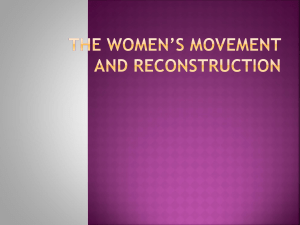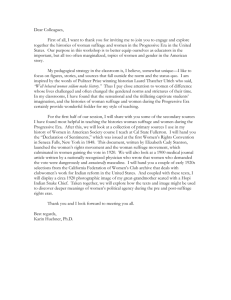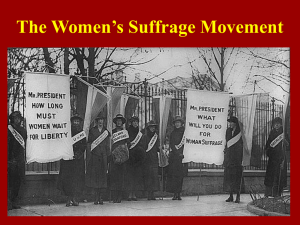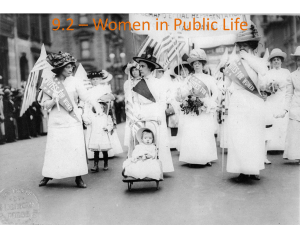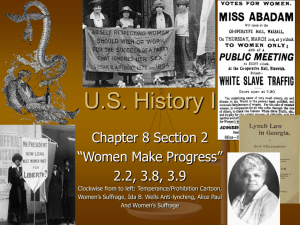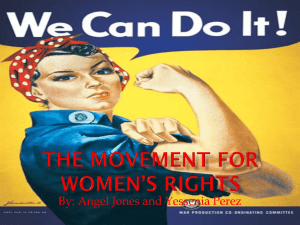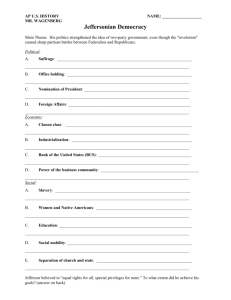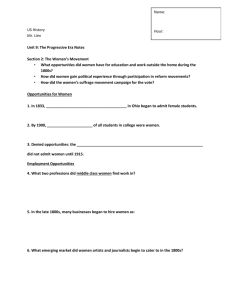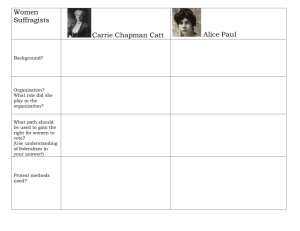Author: Grades: Subjects: Time Required:
advertisement
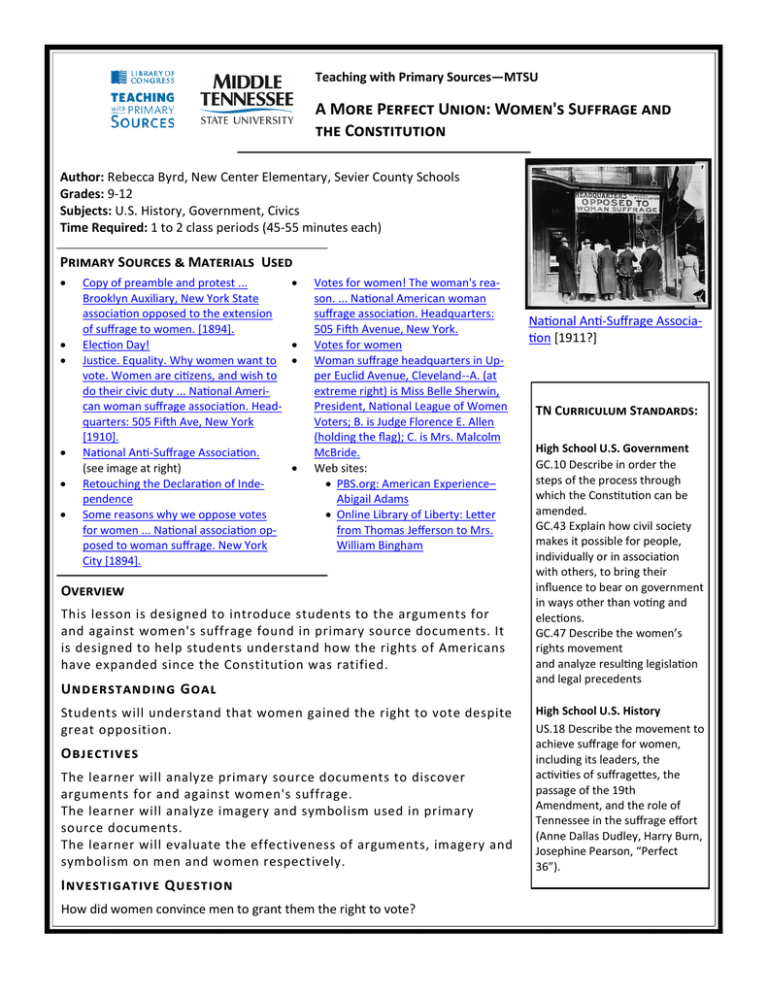
Teaching with Primary Sources—MTSU A More Perfect Union: Women's Suffrage and the Constitution Author: Rebecca Byrd, New Center Elementary, Sevier County Schools Grades: 9-12 Subjects: U.S. History, Government, Civics Time Required: 1 to 2 class periods (45-55 minutes each) Primary Sources & Materials Used Copy of preamble and protest ... Brooklyn Auxiliary, New York State association opposed to the extension of suffrage to women. [1894]. Election Day! Justice. Equality. Why women want to vote. Women are citizens, and wish to do their civic duty ... National American woman suffrage association. Headquarters: 505 Fifth Ave, New York [1910]. National Anti-Suffrage Association. (see image at right) Retouching the Declaration of Independence Some reasons why we oppose votes for women ... National association opposed to woman suffrage. New York City [1894]. Votes for women! The woman's reason. ... National American woman suffrage association. Headquarters: 505 Fifth Avenue, New York. Votes for women Woman suffrage headquarters in Upper Euclid Avenue, Cleveland--A. (at extreme right) is Miss Belle Sherwin, President, National League of Women Voters; B. is Judge Florence E. Allen (holding the flag); C. is Mrs. Malcolm McBride. Web sites: PBS.org: American Experience– Abigail Adams Online Library of Liberty: Letter from Thomas Jefferson to Mrs. William Bingham Overview This lesson is designed to introduce students to the arguments for and against women's suffrage found in primary source documents. It is designed to help students understand how the rights of Americans have expanded since the Constitution was ratified. Understanding Goal Students will understand that women gained the right to vote despite great opposition. Objectives The learner will analyze primary source documents to discover arguments for and against women's suffrage. The learner will analyze imagery and symbolism used in primary source documents. The learner will evaluate the effectiveness of arguments, imagery and symbolism on men and women respectively. Investigative Question How did women convince men to grant them the right to vote? National Anti-Suffrage Association [1911?] TN Curriculum Standards: High School U.S. Government GC.10 Describe in order the steps of the process through which the Constitution can be amended. GC.43 Explain how civil society makes it possible for people, individually or in association with others, to bring their influence to bear on government in ways other than voting and elections. GC.47 Describe the women’s rights movement and analyze resulting legislation and legal precedents High School U.S. History US.18 Describe the movement to achieve suffrage for women, including its leaders, the activities of suffragettes, the passage of the 19th Amendment, and the role of Tennessee in the suffrage effort (Anne Dallas Dudley, Harry Burn, Josephine Pearson, “Perfect 36”). Procedure Prior to the lesson, divide students into equal groups You will need at least one copy of each of the first eight resources listed. You will need one copy of Retouching the Declaration of Independence for each group. Also print at least one copy of Thomas Jefferson's letter to Mrs. Bingham (Library of Liberty)* and Abigail Adams's "Remember the Ladies" letter (PBS.org) for each group. These can be found in the Web sites listed. Step 1 * The Library of Congress has the original letter in its Jefferson collection, but the transcription is not available online from LOC. Step 2 Connect Ask the students to tell you what they know about Thomas Jefferson and Abigail Adams. Discuss their responses. Explain that they will be reading a letter by each that reveals their attitudes towards women's rights. Read the pertinent portions of the letters aloud and discuss the attitudes of each author. Include the following points in the discussion: Jefferson wrote "All men are created equal" for a reason. John Adams did not advocate for women's rights in 1776 (or later). Jefferson thought women should not be troubled with politics. Abigail Adams thought women needed to be protected from the cruelties of some men. Step 3 Construct Give each group a pair of primary source documents. Have them determine which one favors and which opposes women's suffrage. Next, students should create a T chart on which they summarize 3 or 4 of the arguments in each document. Students with graphic sources such as photographs or cartoons should identify and list the symbolism used in each document on their charts. Step 4 Construct Have student groups trade primary source documents. Preferably, groups with written documents the first time will have graphic ones the second time. Repeat analysis using a new T chart. Step 5 Express Allow students to share their findings with the class. Discuss which arguments appeared most often and which they felt would have been most persuasive for men and women respectively. Step 6 Connect Show each group a copy of Retouching the Declaration of Independence. Discuss the symbolism the cartoonist used and the message expressed in the cartoon. Evaluation The students will be evaluated on their participation in the group activity/class discussion as follows: Adequate participation 85/100 points. Additional points may be earned for extraordinary participation. You may also choose to assign one of the extension activities as an individual grade. Extensions Ask students to imagine that Thomas Jefferson and Abigail Adams held a public debate on women's rights. Write and perform a short skit that describes the debate. Have students research any one of the many women who are active in American politics today. Create a biographical poster about their subject. Ask students to compare the arguments for and against women's suffrage with those for and against African American suffrage. Create an acrostic based on the word "suffrage" to express their findings. Have the students imagine that a great number of young people advocate lowering the voting age to 16. Have them write a newspaper editorial for or against such an amendment.

